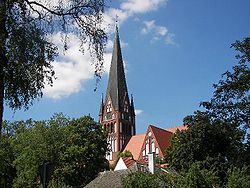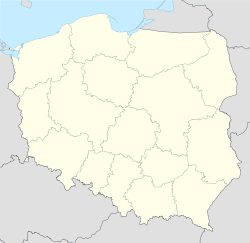- Szczecinek
-
Szczecinek Church in the town 
Flag
Coat of armsCoordinates: 53°43′N 16°41′E / 53.717°N 16.683°ECoordinates: 53°43′N 16°41′E / 53.717°N 16.683°E Country  Poland
PolandVoivodeship West Pomeranian County Szczecinek County Gmina Szczecinek (urban gmina) Established 1310 City rights 1310 Government – Mayor Jerzy Hardie-Douglas Area – Total 48.63 km2 (18.8 sq mi) Population (2010) – Total 40,211 – Density 826.9/km2 (2,141.6/sq mi) Time zone CET (UTC+1) – Summer (DST) CEST (UTC+2) Postal codes 78-400, 78-401, 78-402, 78-403, 78-404, 78-410 Area code(s) +48 94 Car plates ZSZ Website http://www.szczecinek.pl Szczecinek [Polish pronunciation: [sz] (
 listen)] (German: Neustettin; Kashubian: Nowé Sztetëno) is a city in Middle Pomerania, northwestern Poland with some 39,777 inhabitants (2007). Previously in Koszalin Voivodeship (1950–1998), it has been the capital of Szczecinek County in the West Pomeranian Voivodeship since 1999. It is an important railroad junction, located along the main Poznań - Kolobrzeg line, which crosses there with the less important lines to Chojnice, Słupsk and Runowo Pomorskie. Its population is more than 40 thousand inhabitants, as of January 2011. The city boundaries were expanded in 2009 to include Świątki and Trzesieka, a total area of 48.63 km2 (18.78 sq mi).
listen)] (German: Neustettin; Kashubian: Nowé Sztetëno) is a city in Middle Pomerania, northwestern Poland with some 39,777 inhabitants (2007). Previously in Koszalin Voivodeship (1950–1998), it has been the capital of Szczecinek County in the West Pomeranian Voivodeship since 1999. It is an important railroad junction, located along the main Poznań - Kolobrzeg line, which crosses there with the less important lines to Chojnice, Słupsk and Runowo Pomorskie. Its population is more than 40 thousand inhabitants, as of January 2011. The city boundaries were expanded in 2009 to include Świątki and Trzesieka, a total area of 48.63 km2 (18.78 sq mi).Contents
Location
Szczecinek lies in eastern part of West Pomeranian Voivodeship. It's located on border of Pojezierze Szczecineckie and Pojezierze Drawskie. Historically, it was included within Western Pomerania. In 2010, city boundaried with following villages located in Gmina Szczecinek: Gałowo, Marcelin, Godzimierz, West Pomeranian Voivodeship, Turowo, Parsęcko, Buczek and Zółtnica.
History and etymology
In 1310, the castle and town was founded under Lübeck law by Duke Warcislaw IV of Pomerania-Wolgast and modelled after Szczecin (German: Stettin) which is situated about 150 km (93.21 mi) to the west. The initial name was "Neustettin" (Polish: Nowy Szczecin, German: Neustettin, Latin: Stetin Nova). It was also known as "Klein Stettin" (Polish: Mały Szczecin, German: Klein Stettin). In 1707 the town was known in Polish as Nowoszczecin, while the Mały Szczecin name gradually developed into the modern name Szczecinek.
The town was fortified to face the Brandenburgers, with a wall and palisades. In 1356 Neustettin was hit by the plague. Thankful for their survival, the Dukes Bogislaw V, Barnim IV and Wartislaw V founded the Augustine monastery Marienthron, on the Mönchsberg on the southern bank of lake Streizigsee. Under Duke Wartislaw VII Neustettin was from 1376 to 1395 seat of his Duchy. Afterwards, it was ruled by pommeranian Duchy Rügenwalde (-1418), Wolgast (-1474) and Stettin (until 1618).
File:Wappen Neustettin1 Freistaat Pr.png1918-1947On 15 September 1423, the "great day of Neustettin", the Pomeranian dukes, the Hochmeister of the Teutonic Order and Nordic king Eric VII of Denmark met to discuss defense against the union of Brandenburg and Poland. In 1461 Neustettin was sacked, looted and burned by Polish troops and Tatars because King Casimir IV wanted to take revenge on Eric II of Pomerania-Wolgast who supported the Teutonic Knights.
At the end of the Thirty Years War Neustettin became part of Brandenburg, and in 1701 under the crown of Prussia. In 1945, the Red Army occupied the town and put it under Polish administration.
Education
- Wyższa Szkoła Kupiecka in Łódź, branch in Szczecinek
- Duchess Elizabeth Secondary School
- Vocational Schools of Economics in Szczecinek
- Vocational Technical Schools in Szczecinek
- Vocational Schools Agriculture in Świątki.
Major corporations
- Grupa Kronospan SA
- KPPD Szczecinek SA
- Elmilk Sp. z o.o.
Historical population
1940: 19,900 inhabitants (mostly Germans)
1945: 11,800 inhabitants (8,300 Poles and 3,500 Germans)
1950: 15,100 inhabitants (mostly Poles)
1960: 22,800 inhabitants
1970: 28,700 inhabitants
1975: 32,900 inhabitants
1980: 35,700 inhabitants
1990: 41,400 inhabitants
1995: 42,300 inhabitants
2000: 38,928 inhabitantsNotable residents
- Eckart Afheldt (1921–1999), general
- Eberhard Heder (b. 1918), Captain in the Waffen-SS during World War II, recipient of the Knights Cross of the Iron Cross
- Hans Krüger (1902–1971), politician
- Ewa Minge, fashion designer
- Małgorzata Ostrowska (born 1958), singer
- Gustav Behrend (1847–1925), dermatologist
- Lothar Bucher (1817–1892), publicist
- Artur Bugaj (b. 1970), footballer
- Aleksander Wolszczan (b. 1946), astronomer
- Abraham Springer, great-grandfather of TV presenter Jerry Springer, was a prominent member of the town's Jewish community who launched an unsuccessful attempt to sue agitator Dr Ernst Henrici in 1881, claiming that an inflammatory anti-semitic speech in the town led directly to the burning down of the synagogue on 18 February of that year.[1]
International relations
Twin towns — Sister cities
Szczecinek is twinned with:
References
- Notes
External links
Seat: Szczecinek (urban gmina)Urban-rural gminas 
Rural gminas Categories:- Cities and towns in West Pomeranian Voivodeship
Wikimedia Foundation. 2010.




